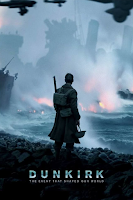Review: Dunkirk
I watched Dunkirk twice. For all Nolan movies, repeat-viewings are absolutely recommended. They give better understanding of complex timelines, unfold additional layers of the story, and I find them enriching and worthwhile. In Dunkirk, repeat-viewing does something basic but far more important- it establishes context.
In stark contrast to previous films, this one has little dialogue, little exposition and except three lines of text at the start, no context. This works against what Nolan intended- to put you on that beach and let you experience the horror yourself. Traditional war movies have central characters to hold on to and you can peak into their minds with the help of dialogues. You can immediately understand what they are going through. Dunkirk gives you unnamed soldiers and expects you to identify with them. It’s not bad but the impact lands late in the story.
To fully enjoy the film, you have to put yourself in the shoes of the soldiers first. Dunkirk is not a story of heroism. It is a story of colossal defeat of Allied soldiers and the horrors they faced while waiting to be rescued. They desperately want to go home which is just over 30 miles away across the sea. But the rescue is slow and the wait is excruciating. The only other choice is to surrender. They are not heroes by any definition. In their own eyes, they are mere survivors running away from an enemy far more superior.
Equipped with this context, the film then becomes a poignant tale about suffering of war and a commentary on the line between heroism and self-preservation. It’s a well made film, with frantic pace, edge-of-the-seat situations, top-notch cinematography, engrossing soundtrack and a very satisfying end. It’s different from other war films in a good way, but it is also Nolan's most demanding film.
***1/2


Comments
Post a Comment